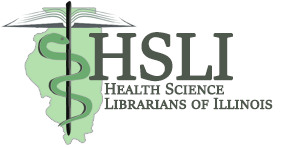Cara Forster (they/them) is the new HSLI Member of the Quarter! Forster is currently the Research & Learning Librarian and a liaison for Nursing, Public Health and Applied Health Sciences, and Biology at Loyola University Chicago. They studied neuroscience as an undergraduate and spent the subsequent four years as a Clinical Genetic Counseling Assistant. Their work focuses on inequitable access to information and Information Justice, fueled by a passion for science literacy.
How did your educational background in neuroscience and your work as a Clinical Genetic Counseling Assistant prepare you for your current position as a science librarian?
It’s funny, because non-librarians always remark on what a big transition I made, but it’s really a natural progression! I studied neuroscience out of a fascination with human development and behavior. While I loved working in labs, I knew that I needed more human interaction–the fatal flaw of an introverted Gemini.
After graduating, I worked as a Clinical Genetic Counseling Assistant in support of clinical testing and retrospective research studies. I interacted with patients, physicians, researchers, genetic counselors, and dozens of other groups that all had their own perspectives, knowledge, and needs. My education and my career gave me disciplinary knowledge and a strong foundation in the principles of learning, cognition, collaboration, and social justice. Librarians can have a million titles, but at the end of the day, I am an educator and a communicator.
How would you define “Information Justice”, and what can librarians do to promote it in their everyday work?
The core of Information Justice is the empowerment of diverse individuals and groups in the development, access, and use of information. This can look like a million different things, so the possibilities for promotion are endless. I would encourage librarians to challenge the frameworks that they use to assess equity. We often look for tools that allow individuals to fit within existing systems, but true Information Justice calls for communities to dismantle and reinvent the systems collaboratively themselves.
The theme of this year’s HSLI Annual Conference is “Stepping Out of the Pandemic: Improvement and Strength”. How has your focus on public health and science literacy enabled you to address health and medical misinformation, both relating to the pandemic and more broadly?
One of the main reasons that I became an academic health sciences librarian was to improve health literacy. In my MLIS program, the fabulous Dr. Beth St. Jean made us dive deep into the information-seeking behaviors of individuals who have health or medical questions. There is so much misinformation online, on public signage, and among social networks, and people have personal and cultural reasons for considering those various sources to be “authoritative”, regardless of the critiques that we could provide.
Dr. St. Jean shared a vital consideration for multicultural identities, and I now try to foster this in my students. I teach them to search laterally and cross-reference with reliable sources, and I also teach them to meet their patients, families, and communities within their trusted information channels. A scholarly article can be incredibly valuable, but we need individuals with scientific literacy to create and challenge the content that exists in various public forums.
What motivated you to become active in HSLI? To what other professional organizations do you belong?
I moved from Maryland to Illinois almost immediately after finishing my MLIS program in December, 2021. I’m still a new librarian, and I wanted a way to connect with colleagues and continue to learn. HSLI has been such a fantastic resource for that! I’m also a member of several other organizations, including IACRL, the Lifelong Information Literacy group (LILi), and MLA.
If you could spend one day with a famous librarian or public health figure, either living or deceased, who would it be, and why?
Oh, gosh. I’m terrible at choosing things like this. Someone who popped into my head is Dr. Michelle Birkett, current Director of the CONNECT Complex Systems and Health Disparities Research Program within the Institute for Sexual and Gender Minority Health and Wellbeing at Northwestern University’s Feinberg School of Medicine. She gave an incredible presentation over the summer at “Salon ’23: Data Science for Social Thinkers” on her network analysis of health disparities among gay men and transwomen in Chicagoland. I’m a huge fan of network analyses (shout-out to UMD professor Dr. Jen Golbeck, for teaching me Gephi), and as a Queer Chicago resident, I was personally fascinated by the maps and networks of the participants migratory social patterns and disease transmission. I’d love to discuss Dr. Birkett’s research methodology more thoroughly!

